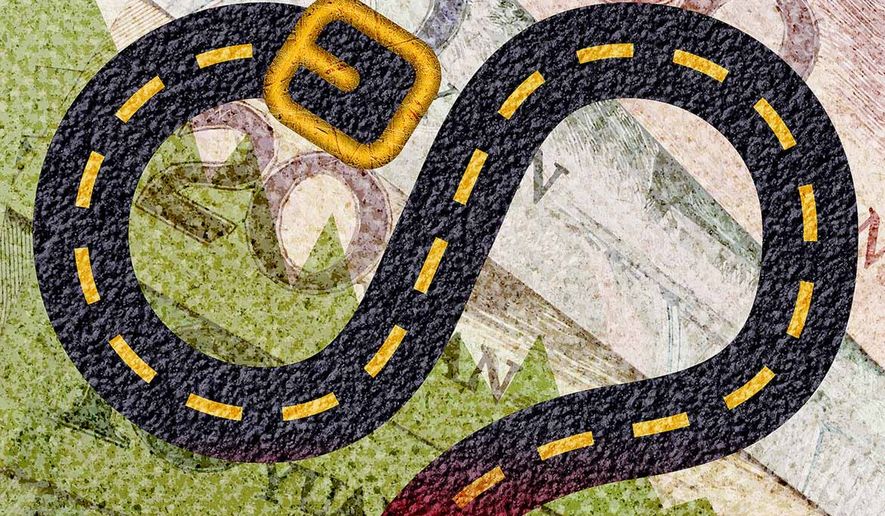OPINION:
The Chinese Communists have succeeded in making sufficient compromises with capitalism to create the world’s second-largest economy. Despite those compromises, it was probably overconfidence in its economic power that has led China into economic problems that could limit its aggression.
A nation’s economy will either propel or constrain its military might. As this column has expressed more than once, America’s military can defend us primarily because it is supported by our economic strength and prosperity. China’s economy is suffering several economic crises at once, so the question is whether that will make Xi Jinping’s regime more or less aggressive.
The Chinese Communist Party’s (CCP) “congress,” held every five years, is intended to confirm and applaud the nation’s leaders. The next one, which is to convene on October 16, will feature great praise for Mr. Xi, much bellicose talk of forcing unification with Taiwan and no mention of China’s economic problems.
Mr. Xi is the most powerful Chinese leader since Mao Zedong. His “thought,” like Mao’s, is prescribed study for China’s students, military and politicians. He will be re-elected to a third presidential term and may be elected chairman of the CCP, a title no one has held since 1982.
Mr. Xi may try to ignore China’s economic problems but they will not simply disappear. Those problems mostly stem from bad loans made under China’s “Belt and Road Initiative” (BRI), a mortgage banking crisis and Beijing’s zero-COVID policy.
China is the largest creditor nation in the world. Through the BRI, China has lent hundreds of billions of dollars to third-world countries around Asia and Africa. Part of the price of those loans was China’s ability to use parts of those nations, such as the port city of Gwadar in Pakistan, for its own military purposes. A BRI loan to Equatorial Guinea may enable China to establish its first Atlantic naval base and another load will mean a similar base in Nicaragua.
The entirely foreseeable problem is that most of those countries were, and are, bad economic risks. According to a Financial Times report, many of those loans are not being repaid which has stalled many BRI construction projects.
China apparently believed that the cost of those loans, even if not repaid, was worth the strategic military advantages gained. But that cost is increasing at a time the Chinese economy is shrinking.
Some $52 billion in those loans had to be renegotiated in 2020-2021 up from $16 billion in the previous two years. China attempted to “rescue” those loans to stave off default thereby increasing the amount those countries owe. Sri Lanka and Zambia have already defaulted and Zambia and Pakistan have received bailout funding from the International Monetary Fund. Sri Lanka is asking for a similar bailout.
It is too late to stop the IMF’s bailout of Pakistan but the US should prevent a bailout of Sri Lanka and other BRI nations because they would bail China out of its bad loans.
Because of unfinished projects and unpaid mortgages, according to a Bloomberg report, Chinese banks may face domestic mortgage losses of $350 billion, and a reported mortgage payment boycott that extended to ninety cities. China’s central bank has stepped in to provide support to lenders that could require a lender bailout like the one we went through in 2008. The mortgage market is regarded as the foundation of China’s economy. Because it is, China’s $56 trillion banking system is evidently at risk.
The mortgage bailout and BRI bad loans are reflected in China’s economic downturn. It is also reflected in high youth unemployment and inflation at a rate of about 2.7%.
China’s GDP shrank by 2.6% in the second quarter of the year and is expected to shrink again, meeting the definition of a recession. This is largely due to the “zero-COVID” policies that have locked down the populations of major cities. Some lockdowns, affecting tens of millions, have just been extended in at least two Chinese megacities, Chengdu and Shenzhen.
It would be a mistake to equate Russia’s military weakness, demonstrated in its war on Ukraine, with a concomitant Chinese military weakness or impute a Chinese intent to reduce its military aggression. Economic sanctions against Russia have failed to stop or even slow its war on Ukraine.
China, which is embedded too greatly in our economy, is apparently sanction-proof. Mr. Xi is far less patient than his predecessors. He might decide to move against Taiwan before China’s economy shrinks to the point that it cannot afford to.
China’s desire to conquer Taiwan remains one of Mr. Xi’s highest priorities. His military forces have been built with two things in mind: the conquest of Taiwan and prohibiting US forces from entering any conflict there or in the South China Sea. Those “area denial” forces may be capable of preventing US aircraft carriers from entering those areas if war breaks out. Our forces may still be capable of entering the battlespace but the cost of men, ships and aircraft may prove too high.
China’s economic troubles are not entirely beyond our reach. Blocking IMF bailouts of BRI loans should be just the beginning. We may not even do that because President Joe Biden is too soft on China. And Russia. And Iran. And…
• Jed Babbin is a national security and foreign affairs columnist for The Washington Times and contributing editor for The American Spectator.




Please read our comment policy before commenting.